Britain feels full to bursting these days. A trip into London feels like touring the ruins of Babel. You’d be forgiven for mistaking Whitechapel or Edgeware Road for Islamabad or Lahore. But whereas drastic demographic change was once confined to cosmopoles like Leeds, Manchester, and Birmingham, now even local highstreets have seen their share of “enrichment.” It’s as if we emerged from two years of COVID lockdowns, and found our towns rewilded by strangers from all over the globe.
So, when the government’s Office for National Statistics released the annual net migration figures in November, it confirmed what our eyes have already told us: that 1.1 million foreign nationals were added to the population every year, since 2021.
Enjoy independent, ad-free journalism - delivered to your inbox each week
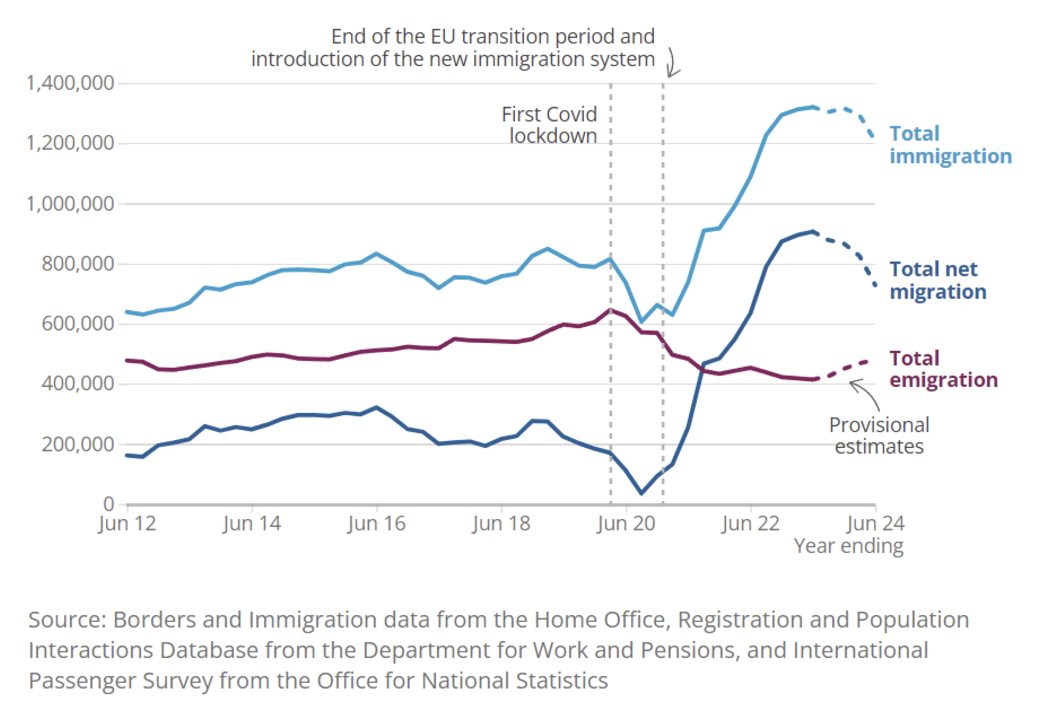
In 2023 – 2024, new 1,207,000 immigrants arrived in Britain. That means a foreign national was granted a non-visitor visa every 30 seconds. This included: 295,000 students; 80,000 study dependents; 184,000 work visas; and 233,000 work visa dependents. 86 percent (1,034,000) were non-European; 10 percent were EU nationals (116,000); and 5 percent (58,000) were British nationals returning home. The most numerous nations of origin were: India (240,000); Nigeria (120,000); Pakistan (101,000); China (78,000); and Zimbabwe (36,000). This is a complete inversion of the ratio before Brexit: when much lower annual net migration was 80 percent EU citizens. Between 2013 – 2020, net migration added 2,570,000 people to the population (1.69 million EU nationals, and 880,000 non-EU. Since 2021, over 2.5 million non-Europeans have been added to Britain’s population.
To put this into context, here is a graph by X user @AylmerTH:
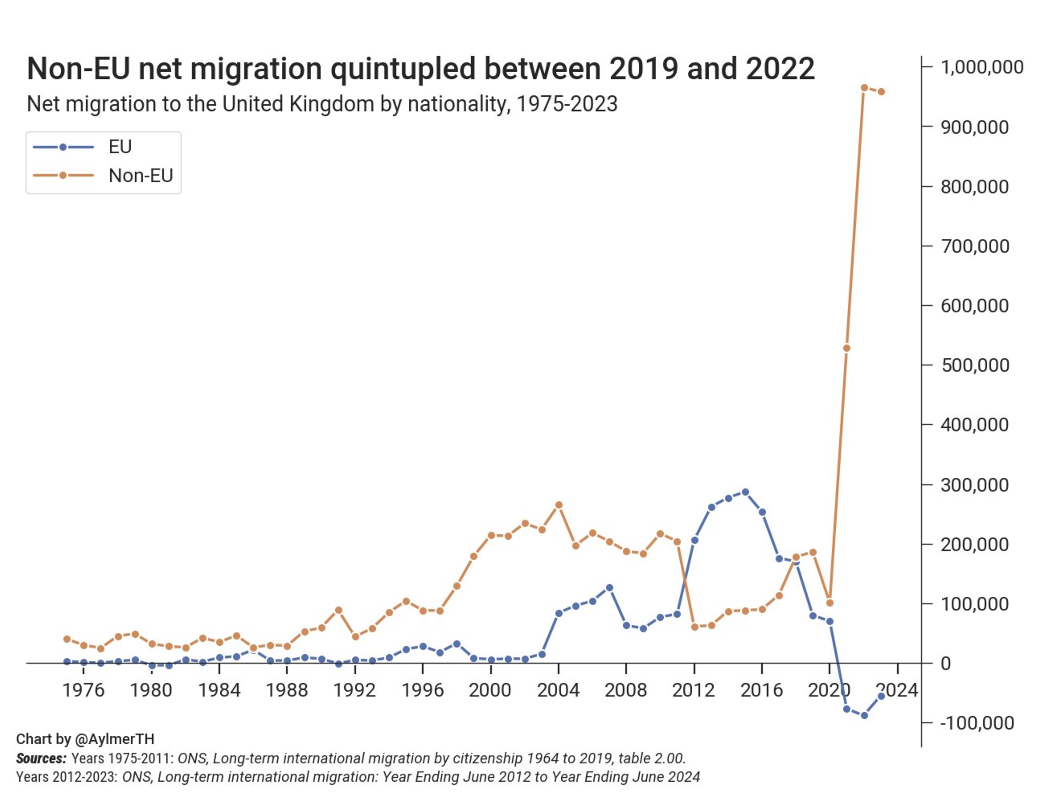
The British government has imported a city the size of Birmingham every year, for the last four years; meaning 18 Birmingham-sized cities will need to be built by 2046 just to accommodate new immigrants alone. (Yet, our Deputy Prime Minister insists “there’s plenty of housing in the UK.”) The foreign born population has exceeded 16 percent — surpassing the percentage share of America’s immigrant population at the height of the wave of migrants arriving at Ellis Island in the nineteenth century. At present rates, Britain will be 54 percent first-generation immigrants by 2083.
This unprecedented change cannot be excused away, as it so often is, with appeals to crises in Afghanistan, Hong Kong, or Ukraine, either. Humanitarian visas comprised less than 10 percent of all immigration in 2022, when each respective crisis was at its peak. 240,000 Indians moved here in the last year — which, last I checked, was not at war.
The British government has imported a city the size of Birmingham every year, for the last four years; meaning 18 Birmingham-sized cities will need to be built by 2046 just to accommodate new immigrants alone.
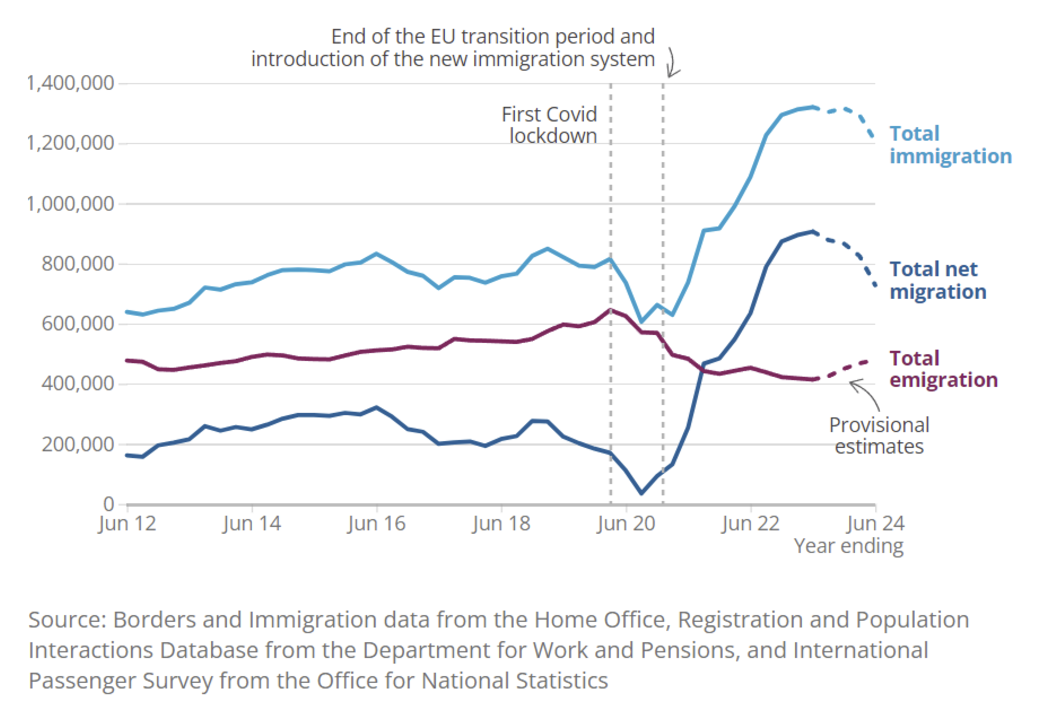
Nor was it driven by essential workers. On the same day, November 28, the annual figures for visas issued between September 2023 – 2024 were also released. In both the net migration and visa figures, skilled worker visas (18 percent) were outnumbered by their dependents (29 percent). Although the figures say 453,000 work visas were issued, almost double the number of dependents to workers received one. Those few work visas are also dwarfed by:
- Study visas: 444,000;
- Family visas: 87,000;
- Refugee visas, via Safe and Legal (Humanitarian) routes: 73,000;
- > 52,000 successful initial-decision asylum applications;
- and >30,000 recorded illegal immigrants who crossed the English Channel in small boats.The total non-visitor visas for September 2023 – 2024 were 1,057,000; in addition to 863,000 granted extensions of stay, 147,000 settlement grants, 405,000 EU Settlement Scheme grants, and 268,000 citizenship grants.
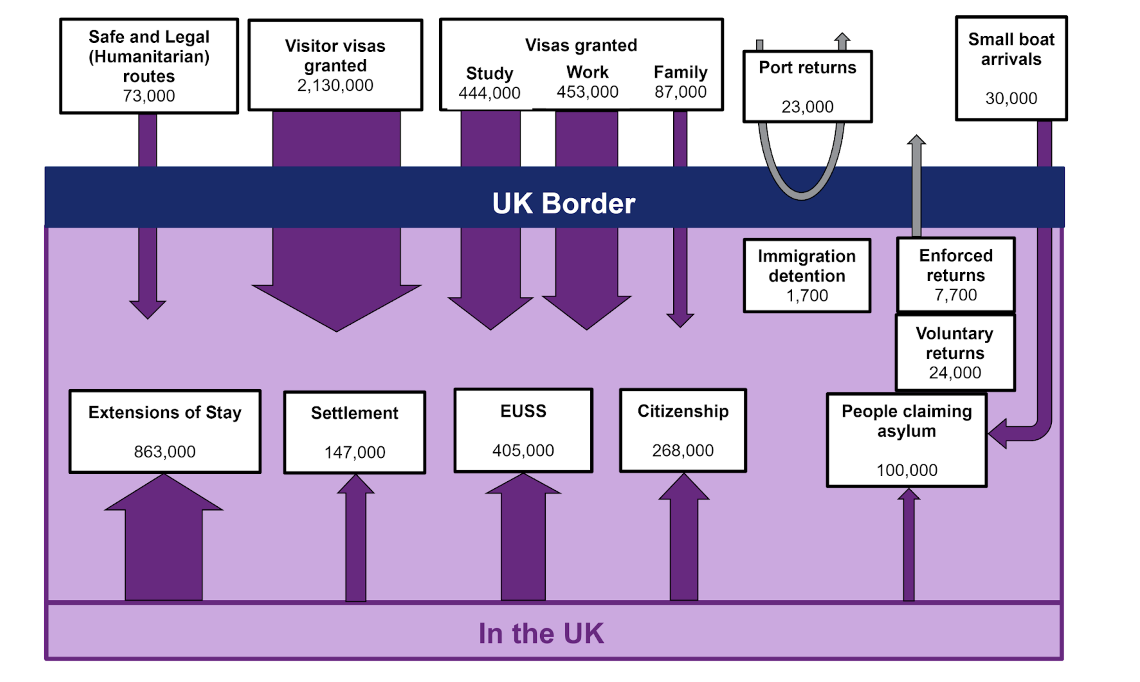
As Shadow Justice Minister, Robert Jenrick revealed in August,
“In the first quarter of this year, the government issued more family visas to the dependants and relatives of Somali nationals (269) than it did work visas to physicists, chemists and biologists from all other countries put together (198).”
Not only is the immigration system not working for Britain: the majority of immigrants aren’t working at all.
As for the argument that immigration is an economic necessity: the Office for Budget Responsibility (OBR) admitted that over 60 percent of migrants on skilled worker visas make less than the median British salary. (Both the Centre for Policy Studies and the Centre for Migration Control estimate >70 percent.) This means most “skilled” workers are net-tax recipients. Half of all skilled workers earn less than half the average salary — and cost the British taxpayer £151,000 each by age of retirement. If they live to life expectancy (81), they cost taxpayers £465,000 each. (This presumes they arrive aged 25; but studies from Denmark and the Netherlands show second-generation non-EU/EA immigrants repeat the economic patterns of their parents and are, on average, never net tax contributors either, while costing more through state-funded healthcare and education.) Rupert Lowe MP has discovered that 40 percent of the immigrants who arrived in 2022 – 2023 are already claiming state benefits. Karl Williams of the Centre for Policy Studies calculated that just 5 percent of all visas issued between 2022 – 2023 were given to immigrants likely to be net tax contributors. For every £1 paid to the Treasury in tax by these high-earning immigrants, the more numerous net-dependents take out £1.60.
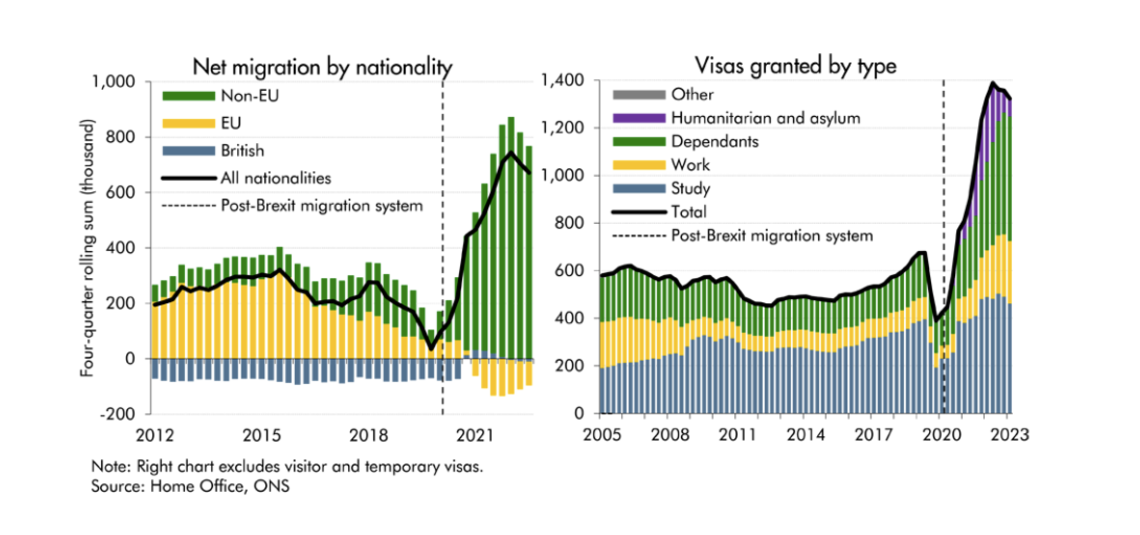
This unprecedented influx of non-European dependents has been dubbed the “Boriswave”. (It even has a Wikipedia page.) They are more identifiable than non-EU migrants by appearance, behaviour, and sheer quantity in a short space of time. Their sudden presence in the service industry, and transport and venue security jobs, is conspicuous. Unusual cultural practices, such as high levels of littering, playing music aloud on public transport, shouting into speakerphone, and wearing unsuitable clothing for Britain’s climate demarcate them as strangers. By importing people en masse from the third-world, Britain is recreating the conditions of the third-world. Indeed, Douglas Murray has repeatedly remarked: “If you import the world’s people, you also import the world’s problems”. This puts the lie to the idea that people are purely rational economic actors, who will abandon backward beliefs and practices, and slot seamlessly into a complex economy like so many cogs, by virtue of being on Western soil. But while our welfare state continues to subsidise their comparatively lucrative lifestyle, and our politicians preach tolerance for all cultures but our own, they will continue to come in their droves.
But while our welfare state continues to subsidise their comparatively lucrative lifestyle, and our politicians preach tolerance for all cultures but our own, they will continue to come in their droves.
Johnson defended the increase in immigration on his watch by saying he, a self-styled anti-establishment populist, had acted on the advice of the Migration Advisory Committee: that increasing migration was the only way to control inflation. With the money supply increased, through quantitative easing, to pay for consecutive COVID lockdowns, Boris needed bodies to spread the excess cash more thinly. This has been called “Human Quantitative Easing” by a number of commentators — and has both failed to curb inflation, while fraying what remains of our social fabric.
We won’t know the true scale of this demographic change until the next Census is released in 2031, as the Boriswave of mass non-European migration didn’t begin until after the 2020 Census was taken. However, the Census showed that London was only 36.8% white British already — meaning the native population are already a minority in their own capital city.
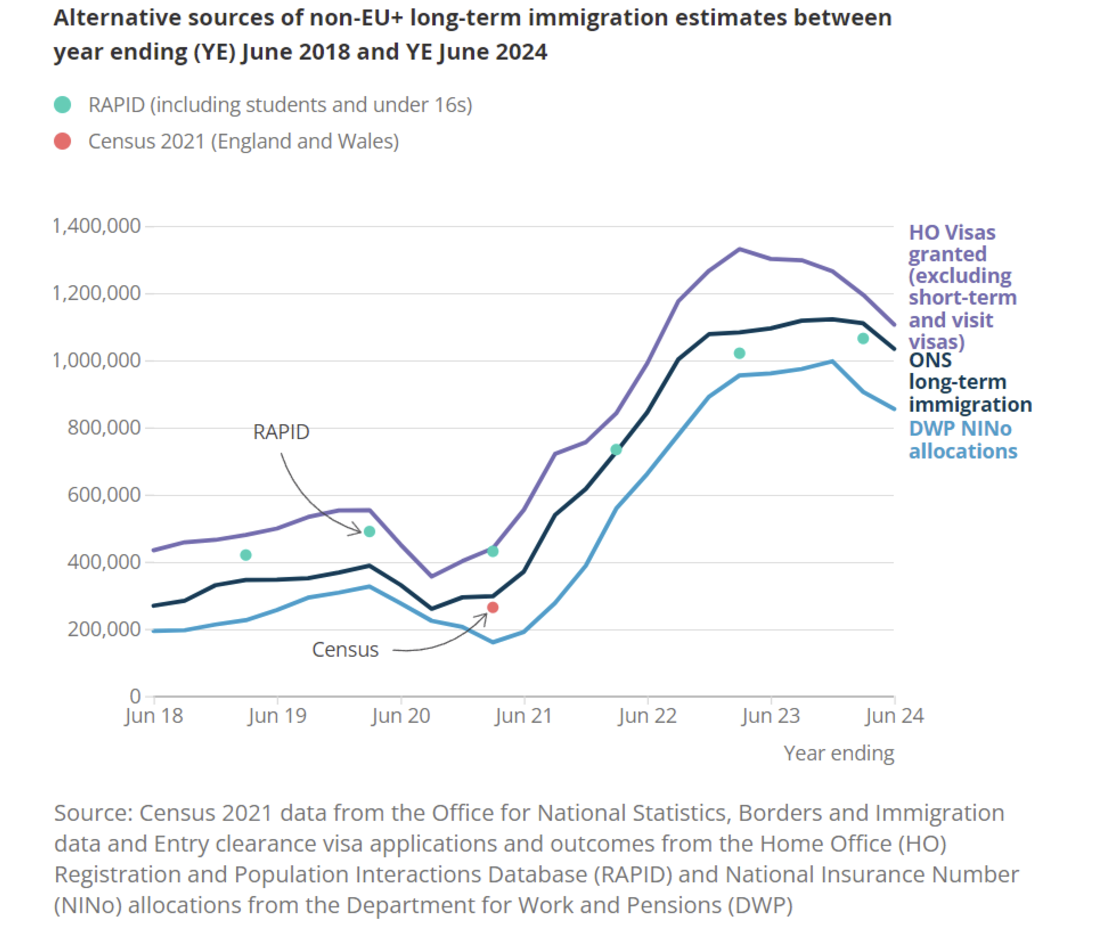
Even if immigration were paused completely, these demographic trends would continue. The ONS also revealed last month that the average total fertility rate (TFR) in Britain fell to 1.44 children per woman, in 2023 — the lowest since records began, in 1938. 591,072 live births were recorded in 2023, which is the lowest since 1977. The UK’s TFR is the fastest falling in the G7, including Japan. The fall in TFR is being driven by childlessness, rather than by women choosing to have smaller families. More than 50 percent of women aged 30 and over have no children, for the first time in recorded history.
But these falling fertility rates are not consistent across all ethnic groups. Coinciding with these net migration and visa figures, the ONS announced that Muhammad is now the most popular baby name in England. It rose from second place last year, and has been in the top 10 since 2016. It was the 63rd most popular in Wales, which goes to show where the demographic change is most concentrated in Britain. This trend is likely to continue, given births to white British mothers fell to 56 percent in 2023, from 74 percent in 2021. An 18 percent decrease in two years, thanks to the Boriswave.
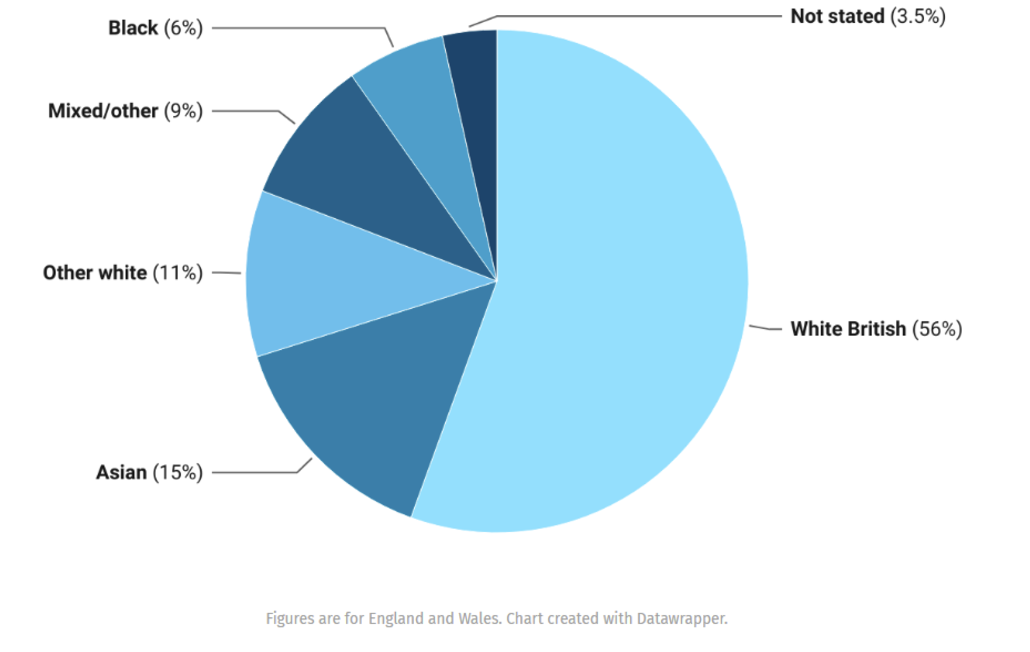
A third (37.3 percent) of children born last year were to parents where either one or both were born outside the UK. (Though a proposed bill to ban first-cousin marriage, rife in Britain’s Pakistani enclaves, could slow that down.)
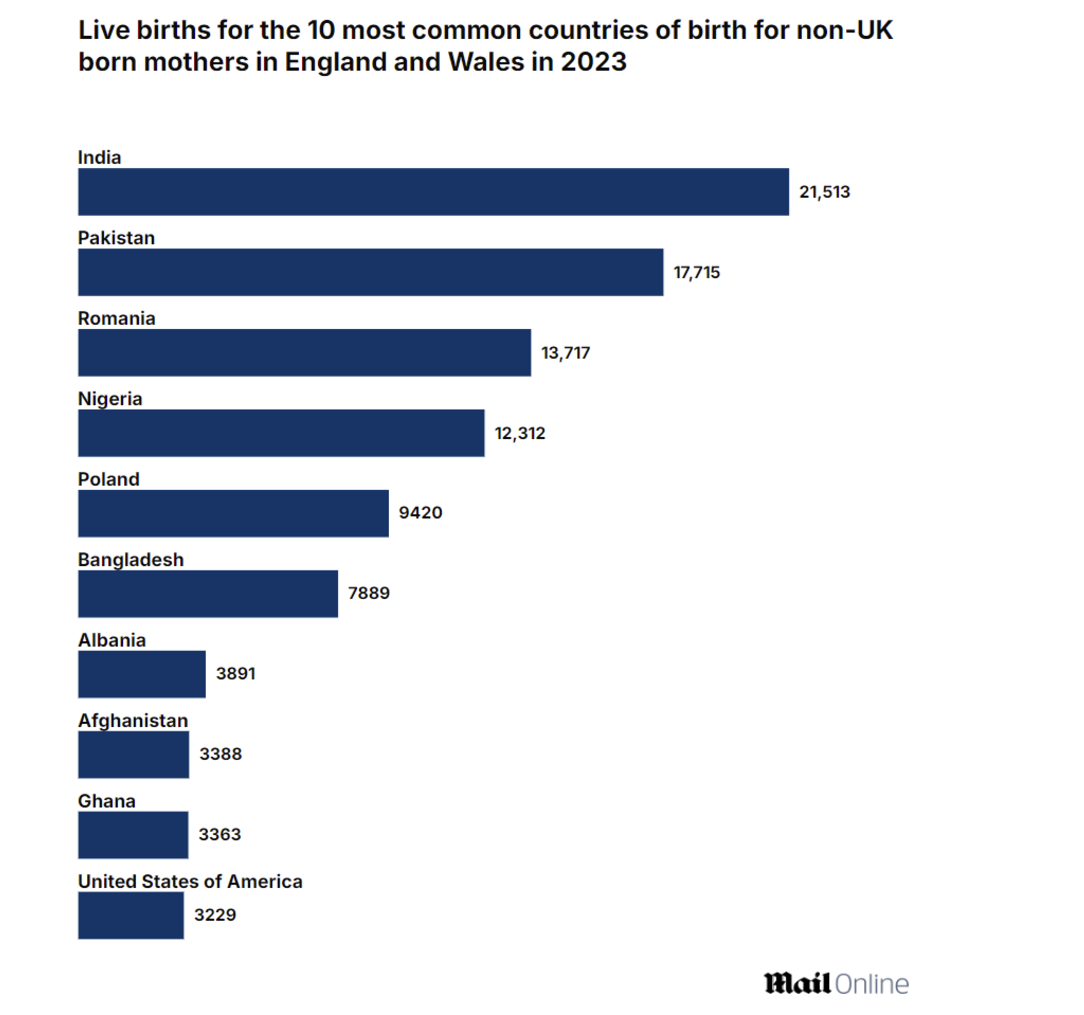
All of these changes have happened in spite of governments promising, at every election since 2010, and the modus operandi of the Brexit referendum being, to reduce immigration. 90 percent of constituencies before the July general election wanted to lower levels of immigration — and that’s when they underestimated the annual number by a factor of ten. The scale of the betrayal is astounding.
Prime Minister Keir Starmer capitalised on the ensuing outrage with a remarkable speech, legitimising every immigration talking point that he condemned as “Far Right” conspiracy theory in the summer.
“But what we didn’t hear… What the British people are owed… Is an explanation. Because a failure on this scale isn’t just bad luck… It isn’t a global trend… Or taking your eye off the ball. No – this a different order of failure. This happened by design, not accident. Policies were reformed… Deliberately … To liberalise immigration. Brexit was used for that purpose… To turn Britain into a one-nation experiment in open borders… Global Britain – remember that slogan… That is what they meant.”
We shouldn’t be fooled by thinking Starmer has changed his mind since writing there is a “racist undercurrent which permeates all immigration law”, or signing a letter in 2020 to halt a deportation flight with 50 Jamaican criminals aboard. Instead, this appears to be a cynical ploy to blame Brexit per se for the Boriswave of immigration, as the pretext to de facto reverse the referendum. In blaming Brexit — as his mentor, Tony Blair, has — for changes to quality and quantity of migrants, Starmer manufactures consent for reinstating freedom of movement with EU member states. Government sources told The Times that free movement for under-30s is an expected concession for reconfiguring trade regulations to be more favourable. Downing Street denied this, but Starmer is reported to be considering a “cultural enrichment programme” for European students to work and live in Britain, to “reset” relations with the EU. It’s possible that Starmer will reduce net migration to OBR projections of 315,000 – 400,000 per year, using reinstated free-movement for Europeans. (Though previous projections of 245,000 per year fell short by a factor of three-to-four.)
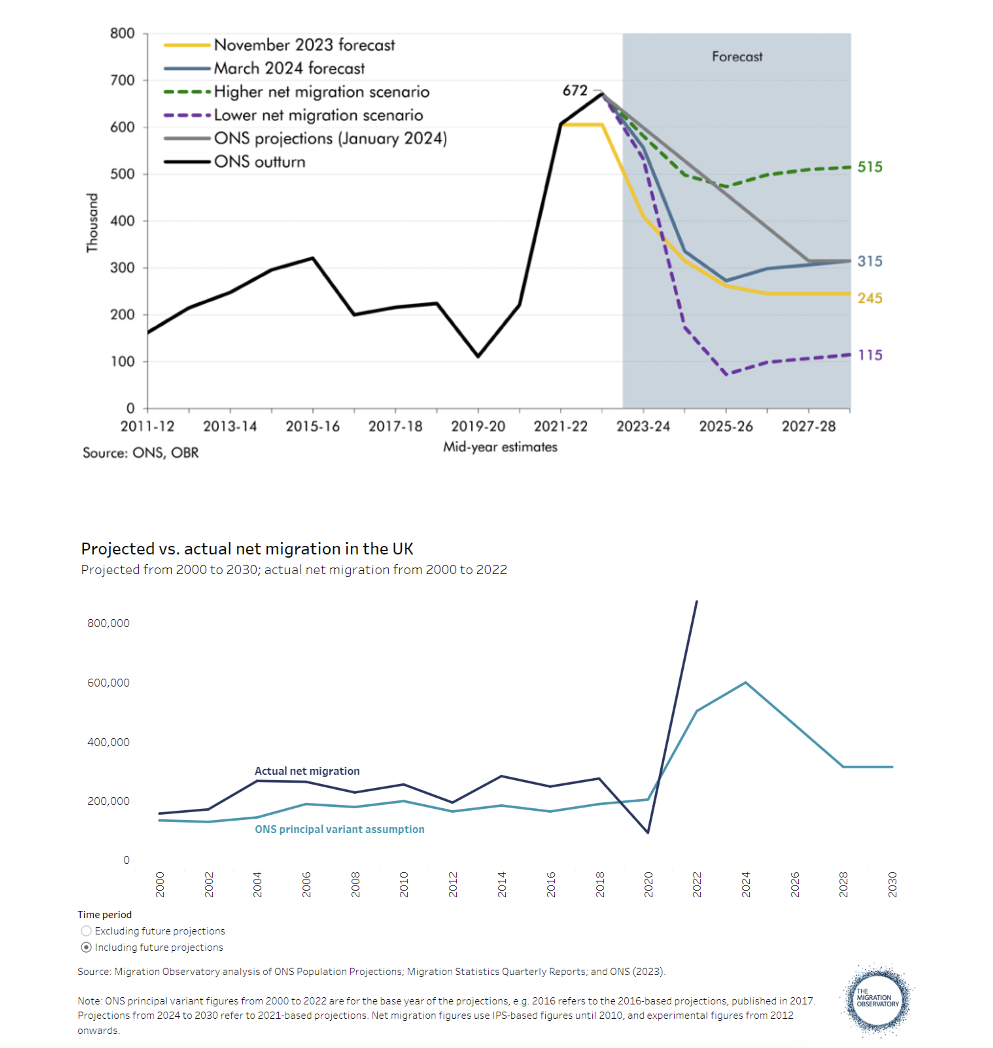
This would make immigration less economically costly, and culturally proximate; but doesn’t stop the demographic churn that the British public complained about during Brexit. Furthermore, litigating the Brexit battle by attempting a soft reversal will only worsen the waning faith in the legitimacy of democracy.
But for the time being, Starmer’s perceived rightward shift on immigration leaves the Conservative party in a double-bind. While the only path to victory is to abandon the radioactively unpopular immigration policies of Boris Johnson and Rishi Sunak, they have elected a new leader, Kemi Badenoch, who is personally responsible for making the problem worse. In a speech in Parliament in 2018, Badenoch boasted:
“As a first-generation immigrant, can I welcome the home secretary’s statement?
“I feel this immigration white paper is a move from the 20th century to a much better future immigration system.
“In particular I’d like to thank the Home Secretary for removing annual limits on work visas and also on international students, both of which I lobbied for on behalf of the Wellcome Sanger Institute and Anglia Ruskin University, which serve my constituency.”
Badenoch not only campaigned to liberalise immigration restrictions since becoming an MP in 2017, but also signals solidarity to “immigrants” as an identity category. This concerning use of identity politics is compounded by her use of “white” as a pejorative: referring to fellow university students as “stupid, lefty white kids,” and calling trans–obsessed actor David Tennant a “rich, lefty, white male celebrity”. Conversely, she has invoked her race as a virtue: saying she achieved despite the bigotry of white teachers, who “thought that black kids were not very academic”, and that her skin colour allows her to make criticisms of multiculturalism that would land the native population in prison. This week, she insisted on identifying as Yoruba, not Nigerian, and has called Boko Haram her “ethnic enemies”. Were the word “white” substituted for “Jewish”, we can be sure Badenoch would have the party whip suspended. Were a white male (like myself) to suggest that British identity is rooted in ethnicity rather than values, they would be condemned by every party in Parliament. Instead, Badenoch is applauded by leadership rival and former Home Secretary, James Cleverly, for showing how “Male, pale, and stale” Labour are by comparison.
Despite Keir Starmer being that unforgivable trinity of non-Woke identities, he is also a more cunning political operative than Badenoch. At both Prime Minister’s Questions sessions since the net migration data was released, Starmer has hammered Badenoch as an architect of the unprecedented levels of net migration. In fact, that charge can be applied to many of Kemi’s front bench: with Priti Patel, the former Home Secretary who remains unapologetic about the record net migration on her watch, now rewarded for her betrayal of the British public with the title of Shadow Foreign Secretary. By playing identity politics, and attempting to beat Labour at their own game, the Tories have elected a leader whose record allows Starmer to masquerade as more credible on the issue which matters most to voters.
By playing identity politics, and attempting to beat Labour at their own game, the Tories have elected a leader whose record allows Starmer to masquerade as more credible on the issue which matters most to voters.
So this leaves Reform UK with a clean slate to capitalise on, as an insurgent party with the strictest policies on both illegal and legal migration. Despite promising on election day that “Reform UK will leave the ECHR and deport all illegal migrants to stop the boats”, leader Nigel Farage has since retreated from this position. In September, he said mass deportations were “impossible” and not his ambition, logistics aside. This caused consternation at Reform’s annual conference. In November, he told Winston Marshall that he would neither deport all the illegal immigrants in Britain, nor provide them amnesty — leaving the >1.2 million foreign criminals residing in Britain in limbo.
However, rising star Rupert Lowe MP has since committed to much stronger positions, and received support from Farage. He is making use of his daily questions allowance in Parliament to procure data that the rest of us cannot: such as social housing occupants by nationality, and crimes committed by illegal migrants. Lowe also told Marshall he expects the true number of illegal migrants is much higher than the Pew Research figure of 1.2 million, from 2017 — and then insisted that they all need to be deported anyway.
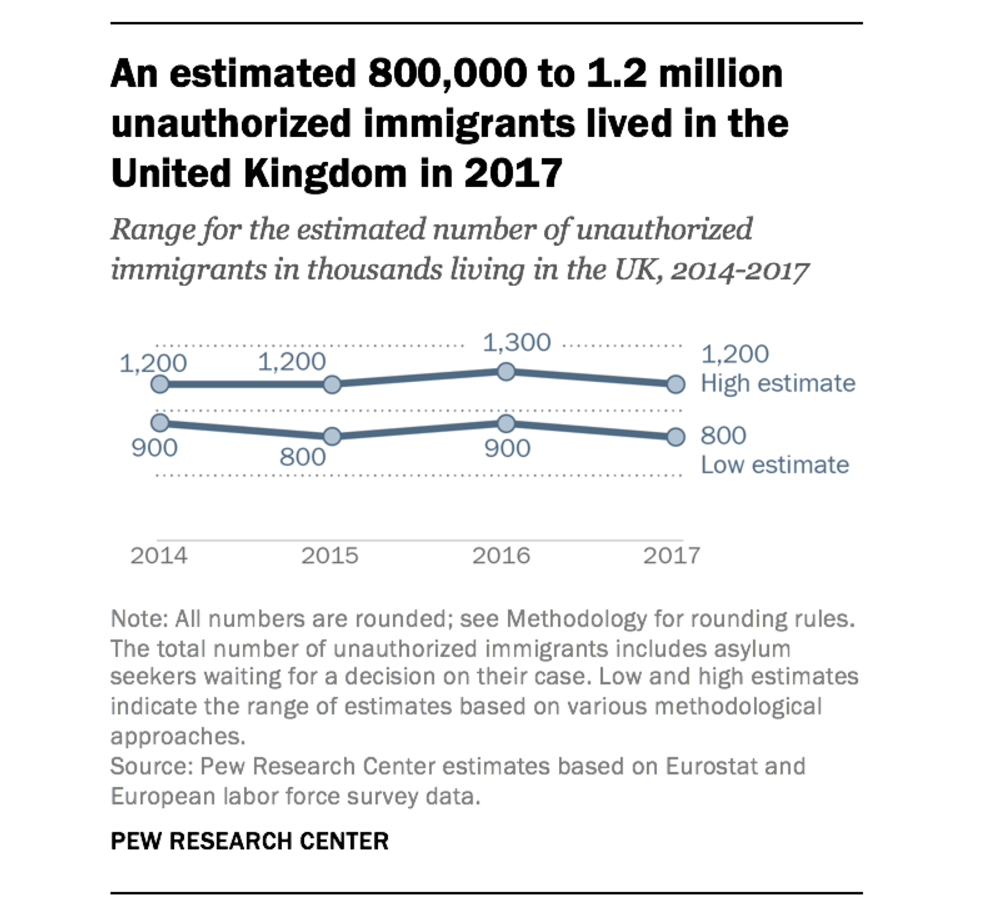
He also went further than Reform’s current stated one-in, one-out policy of “Net Zero” immigration, and advocated a two year moratorium on all inward migration while the government get to grips with deporting illegal migrants. Finally, he urged us to learn from Sweden’s experiment with remigration: subsidising unassimilated migrants to facilitate their voluntary return to their nation of origin. Once Reform publish their policy prospectus next year, I would encourage them to adopt Lowe’s proposals — which have proven to vote winners both for President Trump, and across the European continent.
Measures must be adopted to end Britain’s cultural and economic woes, downstream from unprecedented demographic change. Measures such as ending and rescinding automatic Indefinite Leave to Remain, and blocking access to social housing, free healthcare, and benefits to foreign nationals, are sensible, pragmatic policies which will reduce migration. Laws must be repealed — such as the Human Rights Act (1998), Constitutional Reform Act (2010), and Nationality, Immigration, and Asylum Act (2002) — to do this. But most of all, a greater sense of urgency must be adopted by Parliamentarians, who (save a handful) seem resigned to managed decline.
If we look to post-Soviet states, we can see that nations like Hungary have rebuilt after decades of cultural and economic desolation, because they remained a cohesive people with a shared story and vision. If the demos becomes fractured, split into ethno-cultural silos, then the polis is paralysed by infighting. The time for debate is over. We have the data. Measures must be proposed and passed to deport foreign criminals, slow the inward flow of migration, limit new arrivals to culturally proximate nations, and ensure laws encourage assimilation to the culture and identity of the host population. Otherwise, Britain’s demographic revolution will render it unrecognisable.




Comments (1)
Only supporting or founding members can comment on our articles.